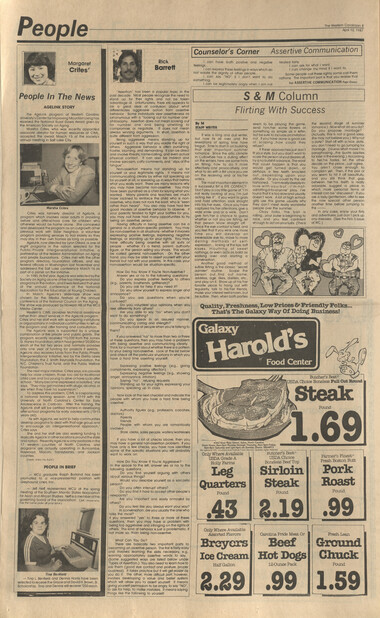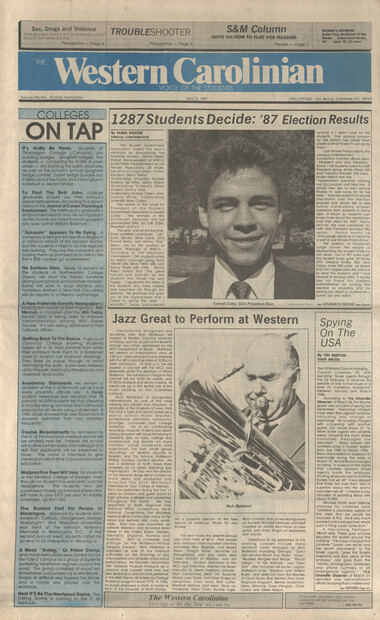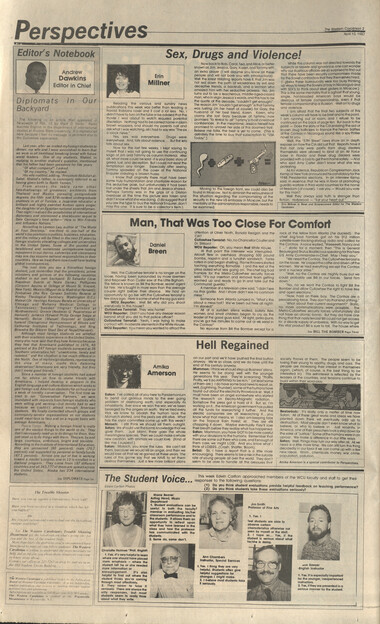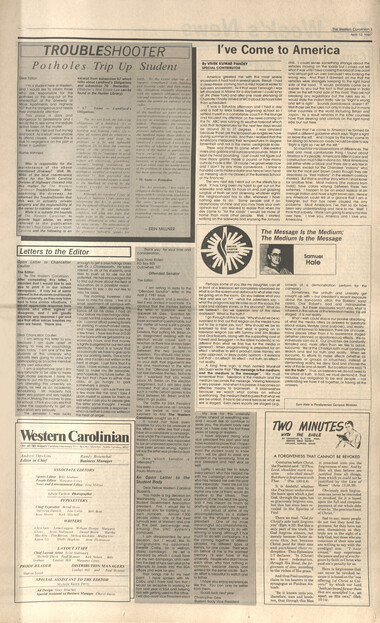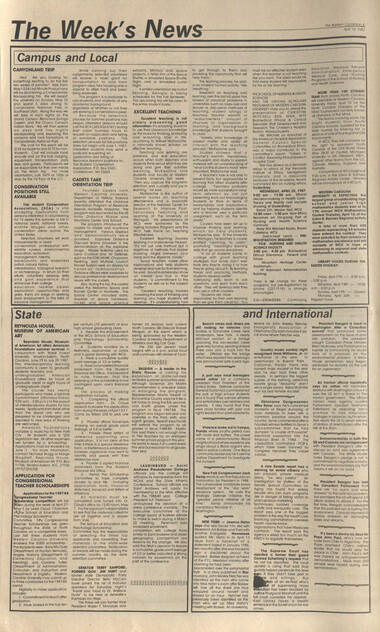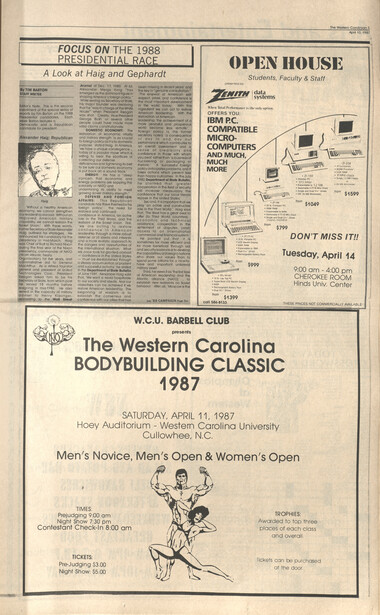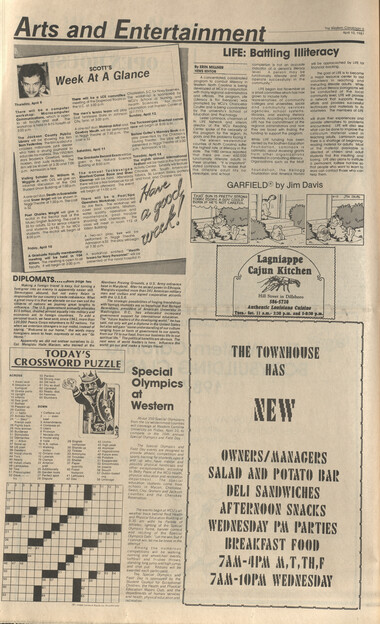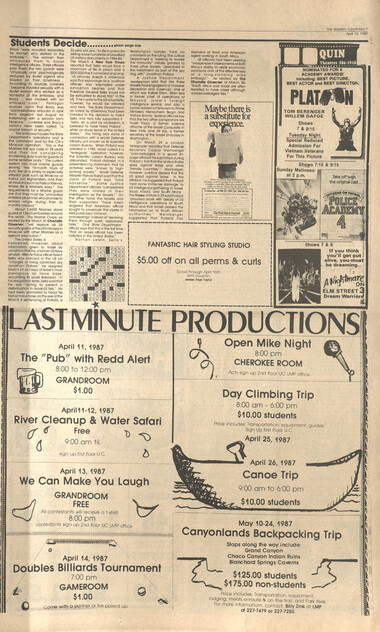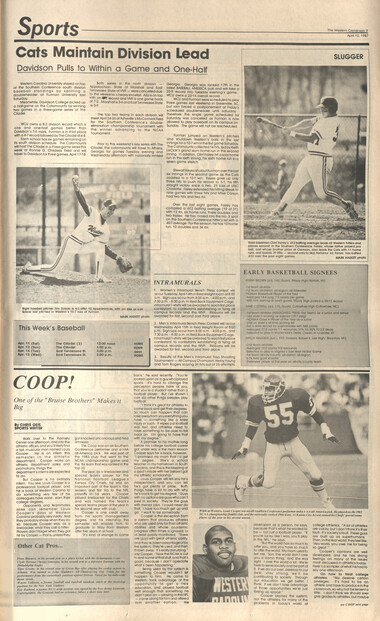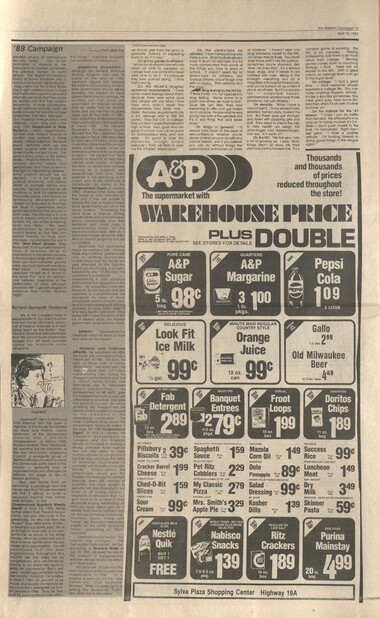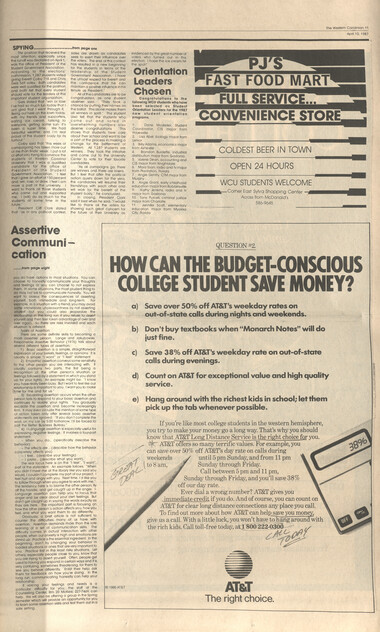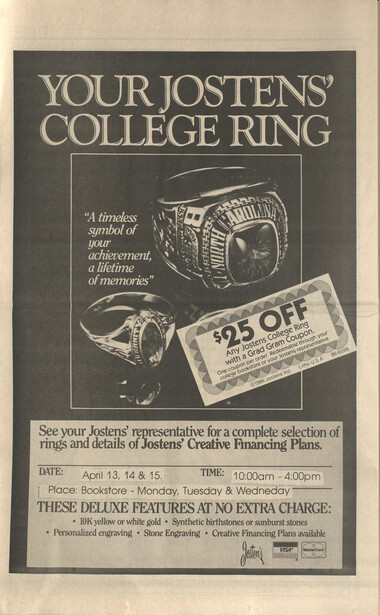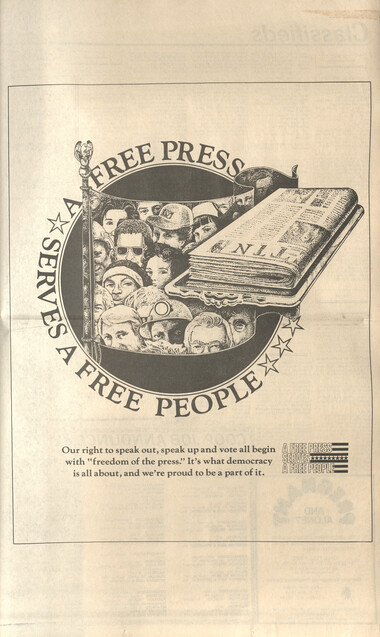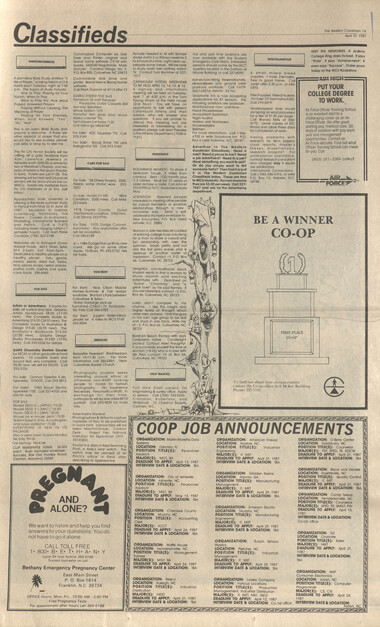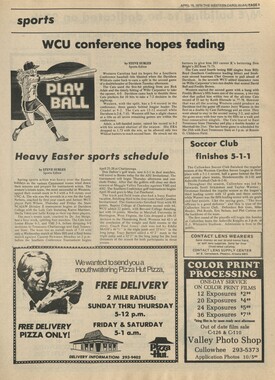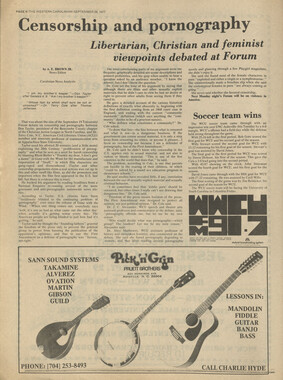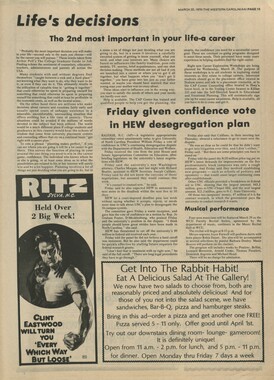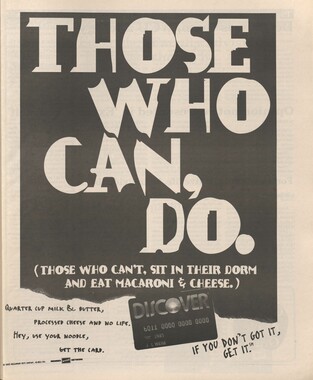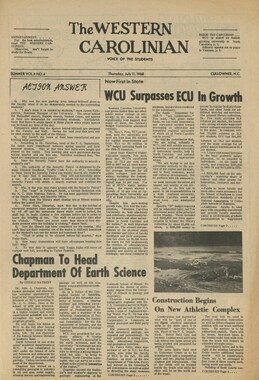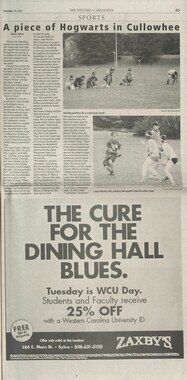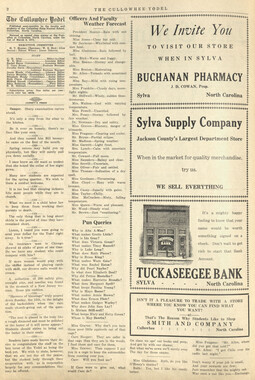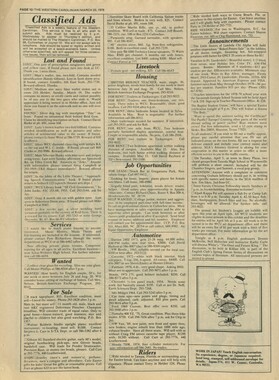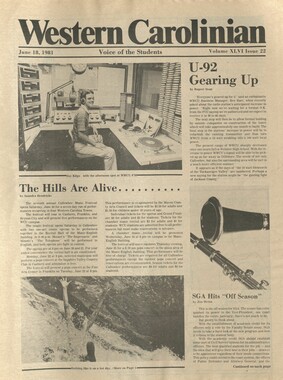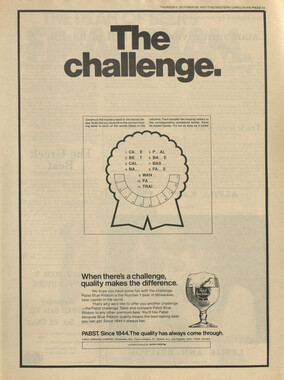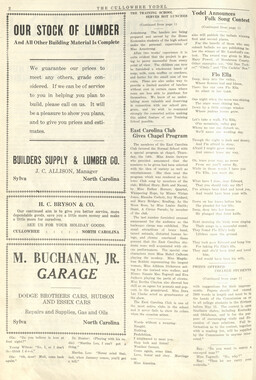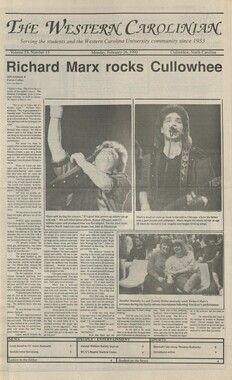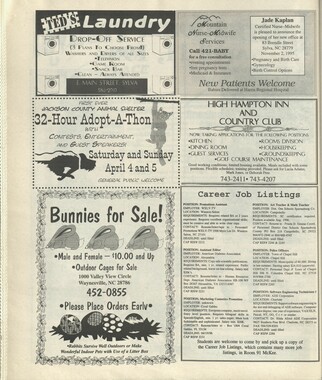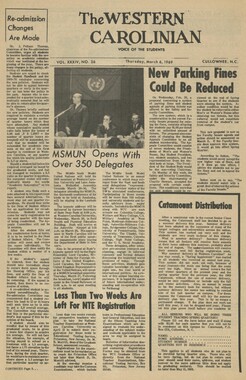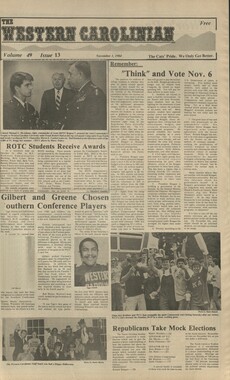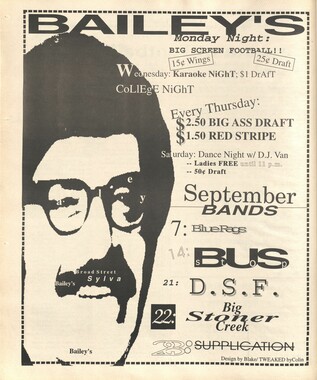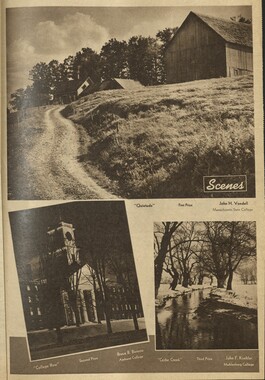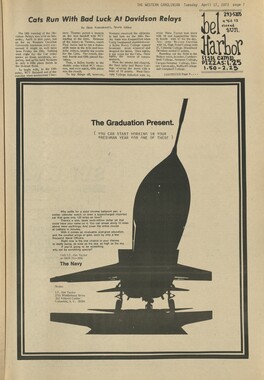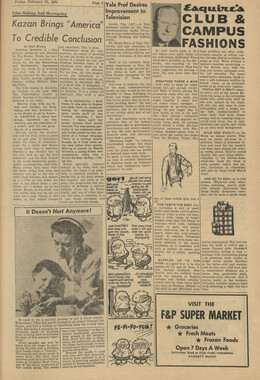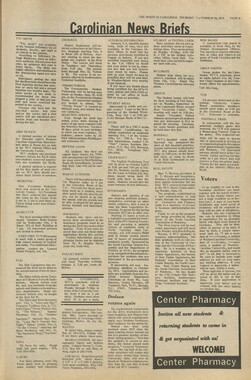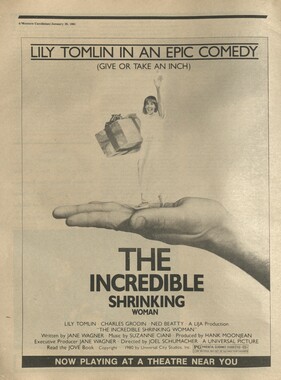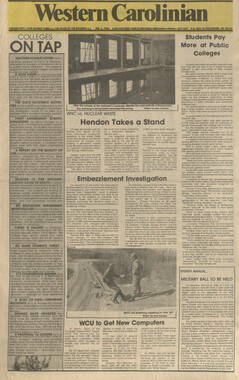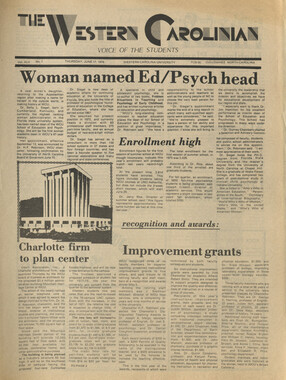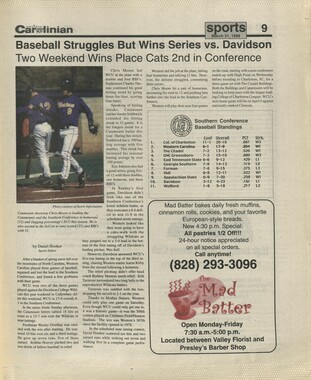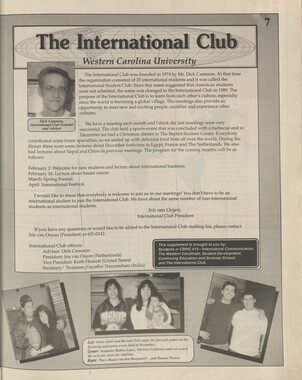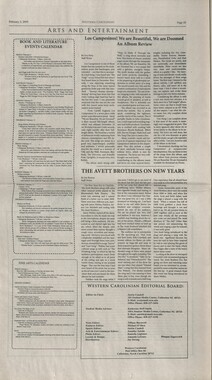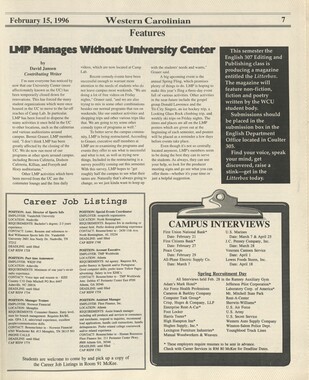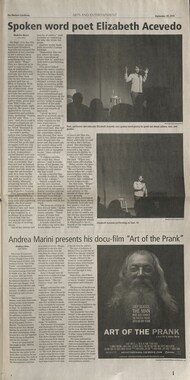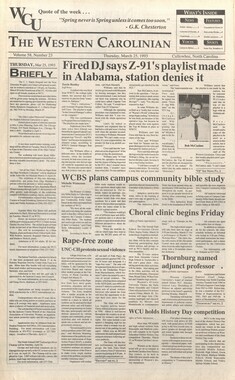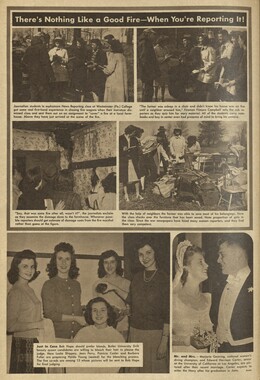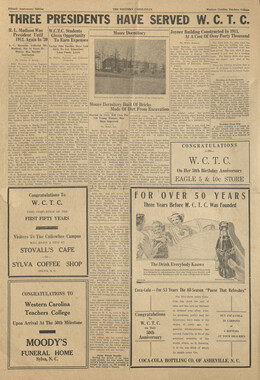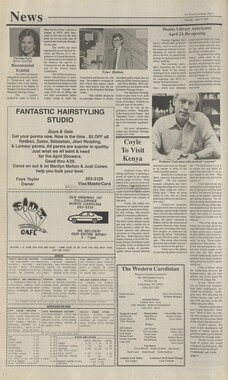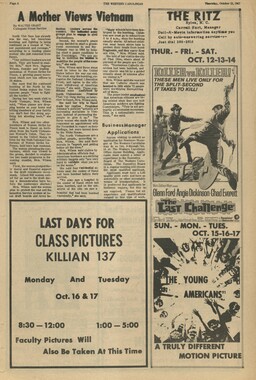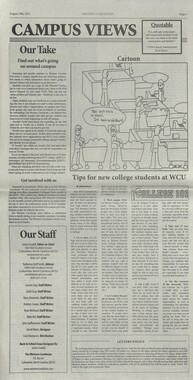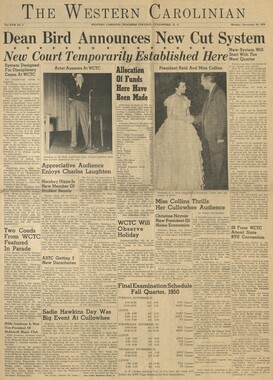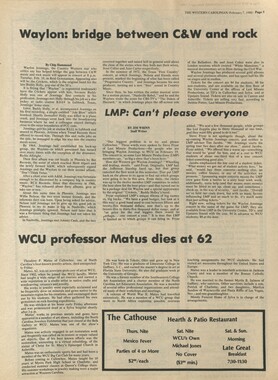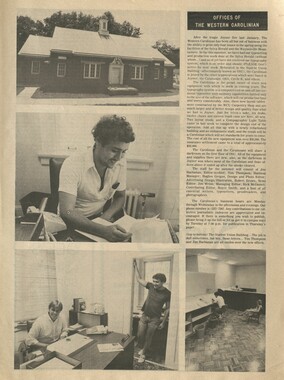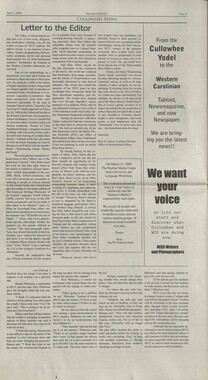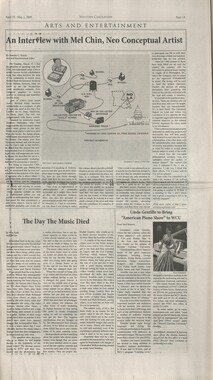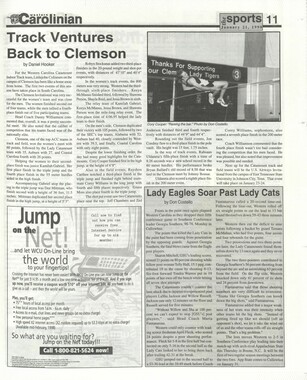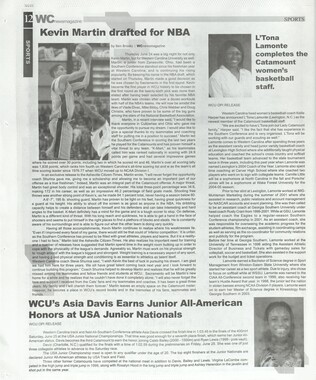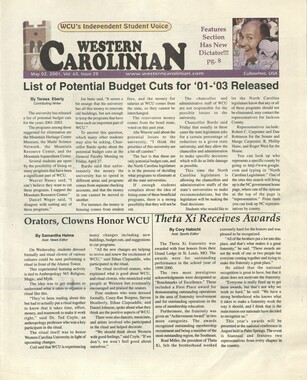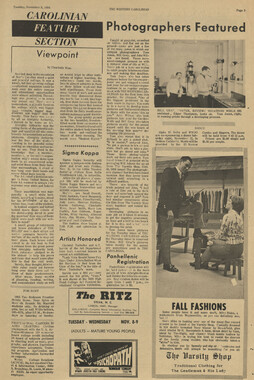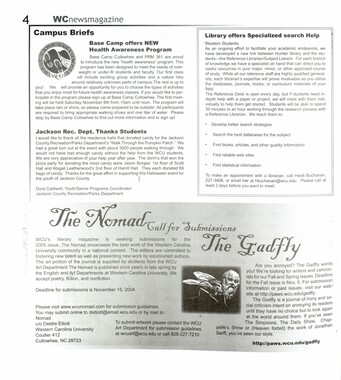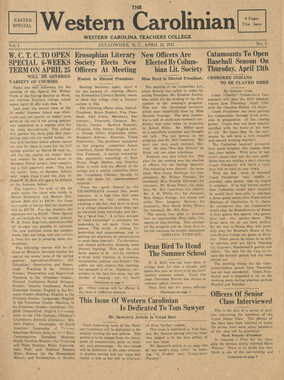Western Carolina University (21)
View all
- Canton Champion Fibre Company (2308)
- Cherokee Traditions (291)
- Civil War in Southern Appalachia (165)
- Craft Revival (1942)
- George Masa Collection (137)
- Great Smoky Mountains - A Park for America (2900)
- Highlights from Western Carolina University (422)
- Horace Kephart (941)
- Journeys Through Jackson (159)
- LGBTQIA+ Archive of Jackson County (85)
- Oral Histories of Western North Carolina (314)
- Picturing Appalachia (6797)
- Stories of Mountain Folk (413)
- Travel Western North Carolina (153)
- Western Carolina University Fine Art Museum Vitreograph Collection (129)
- Western Carolina University Herbarium (92)
- Western Carolina University: Making Memories (738)
- Western Carolina University Publications (2491)
- Western Carolina University Restricted Electronic Theses and Dissertations (146)
- Western North Carolina Regional Maps (71)
- World War II in Southern Appalachia (131)
University of North Carolina Asheville (6)
View all
- Allanstand Cottage Industries (62)
- Appalachian National Park Association (53)
- Bennett, Kelly, 1890-1974 (1463)
- Berry, Walter (76)
- Brasstown Carvers (40)
- Carver, George Washington, 1864?-1943 (26)
- Cathey, Joseph, 1803-1874 (1)
- Champion Fibre Company (233)
- Champion Paper and Fibre Company (297)
- Cherokee Indian Fair Association (16)
- Cherokee Language Program (22)
- Crowe, Amanda (40)
- Edmonston, Thomas Benton, 1842-1907 (7)
- Ensley, A. L. (Abraham Lincoln), 1865-1948 (275)
- Fromer, Irving Rhodes, 1913-1994 (70)
- George Butz (BFS 1907) (46)
- Goodrich, Frances Louisa (120)
- Grant, George Alexander, 1891-1964 (96)
- Heard, Marian Gladys (60)
- Kephart, Calvin, 1883-1969 (15)
- Kephart, Horace, 1862-1931 (313)
- Kephart, Laura, 1862-1954 (39)
- Laney, Gideon Thomas, 1889-1976 (439)
- Masa, George, 1881-1933 (61)
- McElhinney, William Julian, 1896-1953 (44)
- Niggli, Josephina, 1910-1983 (10)
- North Carolina Park Commission (105)
- Osborne, Kezia Stradley (9)
- Owens, Samuel Robert, 1918-1995 (11)
- Penland Weavers and Potters (36)
- Roberts, Vivienne (15)
- Roth, Albert, 1890-1974 (142)
- Schenck, Carl Alwin, 1868-1955 (1)
- Sherrill's Photography Studio (2565)
- Southern Highland Handicraft Guild (127)
- Southern Highlanders, Inc. (71)
- Stalcup, Jesse Bryson (46)
- Stearns, I. K. (213)
- Thompson, James Edward, 1880-1976 (226)
- United States. Indian Arts and Crafts Board (130)
- USFS (683)
- Vance, Zebulon Baird, 1830-1894 (1)
- Weaver, Zebulon, 1872-1948 (58)
- Western Carolina College (230)
- Western Carolina Teachers College (282)
- Western Carolina University (2008)
- Western Carolina University. Mountain Heritage Center (18)
- Whitman, Walt, 1819-1892 (10)
- Wilburn, Hiram Coleman, 1880-1967 (73)
- Williams, Isadora (3)
- Cain, Doreyl Ammons (0)
- Crittenden, Lorraine (0)
- Rhodes, Judy (0)
- Smith, Edward Clark (0)
- Appalachian Region, Southern (2929)
- Asheville (N.C.) (1944)
- Avery County (N.C.) (26)
- Blount County (Tenn.) (195)
- Buncombe County (N.C.) (1680)
- Cherokee County (N.C.) (283)
- Clay County (N.C.) (556)
- Graham County (N.C.) (238)
- Great Smoky Mountains National Park (N.C. and Tenn.) (525)
- Haywood County (N.C.) (3571)
- Henderson County (N.C.) (70)
- Jackson County (N.C.) (4917)
- Knox County (Tenn.) (35)
- Knoxville (Tenn.) (13)
- Lake Santeetlah (N.C.) (10)
- Macon County (N.C.) (420)
- Madison County (N.C.) (216)
- McDowell County (N.C.) (39)
- Mitchell County (N.C.) (135)
- Polk County (N.C.) (35)
- Qualla Boundary (982)
- Rutherford County (N.C.) (78)
- Swain County (N.C.) (2185)
- Transylvania County (N.C.) (270)
- Watauga County (N.C.) (12)
- Waynesville (N.C.) (86)
- Yancey County (N.C.) (72)
- Aerial Photographs (3)
- Aerial Views (60)
- Albums (books) (4)
- Articles (1)
- Artifacts (object Genre) (228)
- Bibliographies (1)
- Biography (general Genre) (2)
- Cards (information Artifacts) (38)
- Clippings (information Artifacts) (191)
- Copybooks (instructional Materials) (3)
- Crafts (art Genres) (622)
- Depictions (visual Works) (21)
- Design Drawings (1)
- Drawings (visual Works) (185)
- Envelopes (73)
- Exhibitions (events) (1)
- Facsimiles (reproductions) (1)
- Fiction (general Genre) (4)
- Financial Records (12)
- Fliers (printed Matter) (67)
- Glass Plate Negatives (381)
- Guidebooks (2)
- Internegatives (10)
- Interviews (815)
- Land Surveys (102)
- Letters (correspondence) (1013)
- Manuscripts (documents) (618)
- Maps (documents) (177)
- Memorandums (25)
- Minutes (administrative Records) (59)
- Negatives (photographs) (6090)
- Newsletters (1290)
- Newspapers (2)
- Notebooks (8)
- Occupation Currency (1)
- Paintings (visual Works) (1)
- Pen And Ink Drawings (1)
- Periodicals (193)
- Personal Narratives (10)
- Photographs (12976)
- Plans (maps) (1)
- Poetry (5)
- Portraits (4568)
- Postcards (329)
- Programs (documents) (181)
- Publications (documents) (2443)
- Questionnaires (65)
- Relief Prints (26)
- Sayings (literary Genre) (1)
- Scrapbooks (282)
- Sheet Music (2)
- Slides (photographs) (402)
- Songs (musical Compositions) (2)
- Sound Recordings (796)
- Specimens (92)
- Speeches (documents) (18)
- Tintypes (photographs) (8)
- Transcripts (322)
- Video Recordings (physical Artifacts) (23)
- Text Messages (0)
- A.L. Ensley Collection (275)
- Appalachian Industrial School Records (7)
- Appalachian National Park Association Records (336)
- Axley-Meroney Collection (2)
- Bayard Wootten Photograph Collection (20)
- Bethel Rural Community Organization Collection (7)
- Blumer Collection (5)
- C.W. Slagle Collection (20)
- Canton Area Historical Museum (2110)
- Carlos C. Campbell Collection (462)
- Cataloochee History Project (64)
- Cherokee Studies Collection (4)
- Daisy Dame Photograph Album (5)
- Daniel Boone VI Collection (1)
- Doris Ulmann Photograph Collection (112)
- Elizabeth H. Lasley Collection (1)
- Elizabeth Woolworth Szold Fleharty Collection (4)
- Frank Fry Collection (95)
- George Masa Collection (173)
- Gideon Laney Collection (452)
- Hazel Scarborough Collection (2)
- Hiram C. Wilburn Papers (28)
- Historic Photographs Collection (236)
- Horace Kephart Collection (861)
- Humbard Collection (33)
- Hunter and Weaver Families Collection (1)
- I. D. Blumenthal Collection (4)
- Isadora Williams Collection (4)
- Jesse Bryson Stalcup Collection (47)
- Jim Thompson Collection (224)
- John B. Battle Collection (7)
- John C. Campbell Folk School Records (80)
- John Parris Collection (6)
- Judaculla Rock project (2)
- Kelly Bennett Collection (1482)
- Love Family Papers (11)
- Major Wiley Parris Civil War Letters (3)
- Map Collection (12)
- McFee-Misemer Civil War Letters (34)
- Mountain Heritage Center Collection (4)
- Norburn - Robertson - Thomson Families Collection (44)
- Pauline Hood Collection (7)
- Pre-Guild Collection (2)
- Qualla Arts and Crafts Mutual Collection (12)
- R.A. Romanes Collection (681)
- Rosser H. Taylor Collection (1)
- Samuel Robert Owens Collection (94)
- Sara Madison Collection (144)
- Sherrill Studio Photo Collection (2558)
- Smoky Mountains Hiking Club Collection (616)
- Stories of Mountain Folk - Radio Programs (374)
- The Reporter, Western Carolina University (510)
- Venoy and Elizabeth Reed Collection (16)
- WCU Gender and Sexuality Oral History Project (32)
- WCU Mountain Heritage Center Oral Histories (25)
- WCU Oral History Collection - Mountain People, Mountain Lives (71)
- WCU Students Newspapers Collection (1923)
- Western North Carolina Tomorrow Black Oral History Project (69)
- William Williams Stringfield Collection (2)
- Zebulon Weaver Collection (109)
- African Americans (390)
- Appalachian Trail (35)
- Artisans (521)
- Cherokee art (84)
- Cherokee artists -- North Carolina (10)
- Cherokee language (21)
- Cherokee pottery (101)
- Cherokee women (208)
- Church buildings (190)
- Civilian Conservation Corps (U.S.) (111)
- College student newspapers and periodicals (2012)
- Dams (108)
- Dance (1023)
- Education (222)
- Floods (61)
- Folk music (1015)
- Forced removal, 1813-1903 (2)
- Forest conservation (220)
- Forests and forestry (1196)
- Gender nonconformity (4)
- Great Smoky Mountains National Park (N.C. and Tenn.) (181)
- Hunting (46)
- Landscape photography (25)
- Logging (119)
- Maps (83)
- Mines and mineral resources (9)
- North Carolina -- Maps (18)
- Paper industry (38)
- Postcards (255)
- Pottery (135)
- Railroad trains (72)
- Rural electrification -- North Carolina, Western (3)
- School integration -- Southern States (2)
- Segregation -- North Carolina, Western (5)
- Slavery (5)
- Sports (452)
- Storytelling (243)
- Waterfalls -- Great Smoky Mountains (N.C. and Tenn.) (66)
- Weaving -- Appalachian Region, Southern (280)
- Wood-carving -- Appalachian Region, Southern (328)
- World War, 1939-1945 (173)
Western Carolinian Volume 52 Number 23
Item
Item’s are ‘child’ level descriptions to ‘parent’ objects, (e.g. one page of a whole book).
-
-
People The Western Carolinian 8 April 10, 1987 Margaret Crites' People In The News AGELINK STORY The AgeLink program of Western Carolina University's Centerfor Improving Mountain Living has received the National Rural Elders Award given by the American Society on Aging. Marsha Crites, who was recently appointed associate director for human resources at CIML, accepted the award March 15 at the society's annual meeting in Salt Lake City. Marsha Crites Crites was formerly director of AgeLink, a program which involves older adults in providing before and after-school care for children who otherwise would be home alone. She conceived and developed the program as an outgrowth other previous work with Elder Neighbor, a volunteer program providing services to frail elderly so they may stay in their own homes as long as possible. AgeLink, now directed by Lynn Dillard, is one of eight programs in the nation selected for the Public/Private Intergenerational Initiative, a partnership of the federal Administration on Aging and private foundations. Crites met with the other program directors, foundation officers, and key federal officials in Washington last November and addressed the Salt Lake conference March 16 as part of a panel on the initiative. In 1985, its first year, AgeLink was selected by the Society on Aging as one of five top intergenerational programs in the nation, and it was featured that year at the annual conference of the National Association for the Education of Young Children. In March, AgeLink's slide-tape show was chosen for the Media Festival at the annual conference of the National Council on the Aging. The show was produced by Howard Hill of the WCU Media Center. Western's CIML provides technical assistance rather than direct services in the AgeLink program. Crites and her staff work with sponsoring institutions or organizations in individual communities to set up the program and offer training and consultation. The AgeLink work is supported by a unique combination of five private and public grants. The program recently received s10,000 from the James G. Hanes Foundation, which had granteds20,000for each of the first two years and normally provides only one year of funding for projects it selects. AgeLink also receives funds from the Public/Private Intergenerational Initiative, led by the Elvirita Lewis Foundation, the Z. Smith Reynolds Foundation, the N.C. Children's Trust Fund, and the Public Welfare Foundation. The next major initiative, Crites says, is to provide help for older children, those too old for traditional child care and too young to drive or have a job after school. "Many become depressed or isolated, "she says. "They may get involved with drugs, alcohol, or sex when they have no supervision." To address this problem, CIML is cosponsoring a national training session June 17-19 with the University of North Carolina's Center for Early Adolescence in Carrboro. After the training, the AgeLink staff will be certified trainers in developing after-school programs for early adolescents (10-15 years old). "As with AgeLink, we want to help communities develop programs to deal with that age group and to encourage an intergenerational approach," Crites says. She and her staff are also seeking funding to replicate AgeLink in other locations around the state and nation. PresentlyAgeLinkisonlyavailableinthe 17 western counties of North Carolina, and programs are actually operating in Buncombe, Haywood, Macon, Transylvania, and Jackson counties. (Yeah, she's my Aunt.) PEOPLE IN BRIEF — WCU graduate Ralph Borland has been promoted to a vice-presidential position with Greyhound Lines, Inc.. — Jeff Neff represented WCU at the spring meeting of the Southern Atlantic States Association for Asian and African Studies. Neff is a member of the governing board of the association, (jetr, i know who has the name plate off your door.) Tina Benfield — Tina L. Benfield and Dennis Harris have been selected to receive the Grace and David H. Brown, Sr. Scholarship. Tina and Dennis will recieve s250each. Rick Barrett "Assertion" has been a popular topic in the past decade. Most people recognize the need to stand up for their rights and not be taken advantage of Unfortunately, there still appears to be a great deal of confusion about what differentiates aggressive action from assertive behavior. Some individuals view assertiveness as synonymous with a "looking out for number one" philosophy. Assertion does not mean looking out for number one and being unwilling to compromise or negotiate. It does not mean always winning arguments. In short, assertion is quite different from aggression. Being aggressive means standing up for yourself in such a way that you violate the right of others. Aggressive behavior is often punishing, hostile, blaming, and demanding. It can be direct and involve threats, name-calling, and even actual physical contact. It can also be indirect and involve sarcasm, catty comments, and "slips of the tongue". Non-assertion means not standing up for yourself or your legitimate rights. It means not communicating clearly by either not speaking up for yourself at all, or speaking up in ways that betray what you really want. There are many reasons why you may have become non-assertive. You may have been punished asa child for saying what you wanted. Many parents and teachers are much more inclined to reinforce the child who is non- assertive, who does not rock the boat, who is "seen rather than heard". You also may have had few good models of assertive behavior to observe. If your parents tended to fight your battles for you, you may not have had many opportunities to try being an assertive person. Having difficulty in being assertive can be a general or a situation-specific problem. You may be non-assertive in all situations -whether it involves expressing positive feelings, expressing negative feelings, or standing up for your rights. You may have difficulty being assertive with all sorts of people - whether it's a friend, parent, authority figure, or the person selling you shoes. This would be called general non-assertion. On the other hand, you may be able to assert yourself with your friends but not with your parents. In this case, your non-assertion would be situation-specific. How Do You Know If You're Non-Assertive? Answer yes or no to the following questions: Do you express positive feelings to others (e.g., parents, boyfriends, girlfriends)? Do you ask for help if you need it? Do you allow yourself to express anger and annoyance? Do you ask questions when you're confused? Do you volunteer your opinions when you feel differently from qfhers? Are you able to say "no" when you don't want to do something? Do you speak in an assured manner, communicating caring and strength? Do you look at people when you're talking to them? If you answered "no" to more than two or three of these questions, then you may have a problem with being assertive and communicting clearly. Think for a moment about whether there is a pattern to your being non-assertive. Look at the list below and check off the particular situations in which you have a hard time asserting yourself: Expressing positive feelings (e.g., giving compliments, expressing affection) Expressing negative feelings (e.g., showing anger, annoyance, irritation) Saying "no"; refusing requests Standing up for your rights, expressing your opinions, speaking up in class Now look at the next checklist and indicate the people with whom you have a hard time being assertive: Authority figures (e.g., professors, coaches, doctors) Parents Friends People with whom you are romantically involved Store clerks, sales people, waiters/waitresses If you have a lot of checks above, then you may have a general non-assertion problem. If you have only a few checks, you have now identified some of the specific situations you will probably want to work on. How Do You Know If You're Aggressive? In the space to the left, answer yes or no to the following questions: Do you find yourself arguing with others about various things? Would you describe yourself as a sarcastic person? Do you often interrupt others? Do you find it hard to accept other people's viewpoints? Are you impatient and easily annoyed by others? Do you feel like you always want your way? In conversation, are you usually the one who talks the most? If you answered "yes" to three or more of these questions, then you may have a problem with being too aggressive and infringing on the rights of others. This kind of behavior is just a problematic, if not more so, than being non-assertive. What Can You Do? There are basically two important parts to becoming an assertive person. The first is fairly easy and involves learning the skills necessary, e.g., learning appropriately assertive words to say. (Some suggested ways are listed below under "Types of Assertion.) You also need to learn how to say them (good eye contact and posture, proper loudness). It takes practice but it will get easier as you do it. The other, more difficult part, however, involves developing a value and belief system which will allow you to assert yourself. It means giving yourself permission to be angry, to say "NO", to ask for help, to make mistakes. It means saying things like the following to yourself: Counselor's Corner Assertive Communication I can have both positive and negative feelings. I can express these feelings in ways which do not violate the dignity of other people. I can say "NO" if I don't want to do something. I can be legitimately angry when I am not treated fairly. I can ask for what I want. I can change my mind if I want to. Some people call these rights; some call them options. The important part is that you realize that See ASSERTIVE COMMUNICATION Page Eleven S c% M Column Flirting With Success By M STAFF WRITER It was a long and dull winter, but now its all over and the revelations of spring time have begun. Time to start in on building that ever important summer romance. Since the artic climate in Cullowhee has a dulling effect on the senses, here are some hints on flirting, how to do it more effectively and provocatively, and what to do with a flirt once you are on the recieving end of his/her antics. The most important element in a successful flirt is EYE CONTACT! Don't play a coy little game of "I'm not really looking at you, I'm just acting like it". If you want to grab and hold attention, look straight into his/her eyes. Once you have captured his/her attentions, give a wide smile and/or a wink. Don't give him/her a chance to guess whether or not you are flirting...let that person know straight off. Once the eye contact is held, and you feel that if you wink one more time you will develop an irreversable eye tic, move to more daring methods of self- expression.... licking of the lips, soft kisses, mouthing of sweet nothings, or even acts as bold as walking over and starting a conversation. Another good method of sutble flirting is the classic "secret admirer" routine. Scope the person out...find out name, address, age. likes, dislikes, etc., and play on it. Show up at his/her favorite place to hang out with regularity, talk to his/her friends, make your interest well known, but be sutble. Then, when both parties seem to be playing the game, send him/her some flowers or something as simple as a letter, but be sure to include an invitation out. If you have done a good job of scoping...how could they refuse? If these approaches just don't fit your style, but you don't want to scare the person of your desires off, tryanobullshitadvance. Theworst that could happen is that you would get turned down, or perhaps a few teeth knocked out...depending upon your attitude. Or you could try the old fashioned, "l-am-really-deeply-in- love-with-you-but -I'm-not- admitting-it-to-anyone" ploy. I've found that it is too slowand usually doesn't work. A lot of high school girls use this game...usually why they don't meet really wonderful people over the summer. Okay folks, the ball is rolling....your pulse is beginning to race, and you feel confident enough to act on your lusts. (This is the second stage of summer romance.) Nowwhatdoyoudo? Do you propose marriage? (Actually, this is not a good idea, she may not believe you.) Why not a date? Start off with a nice date, you don't need to go jumping for marriage. (Guess what movie I'm paraphrasing...the quote applies for later in theevening.) According to her/his tastes, let the other decide on the place....just agree. You aren't close enough to complain yet. Then, if the pair of you seem to hit it off beautifully, and you still think that gap between her/his teeth is really adorable, suggest a place in which more personal items of interest can be "discussed". If you are a lady/gentleman, offer to see the now special other person another time before jumping to the . In any case, enjoy your flirts and adventures, just don't pick up any diseases. (See the Feb. 5 issue ofWC.) Quality, Freshness, Low Prices & Friendly Folks... That's The Galaxy Way Of Doing Business! Butcher'! JJSDA Choice Boneless Full Cut Bound Steak Pound •342'West Main Street, Sytva, North Carolina Hours: 8am-8pm Monday through Thursday, 8am-9pm Friday, 8am-flpm Saturday and lpm-6pm on Sunday. Phone: 5864073 ' Fa' .69 Store We welcome W1C Vouchers and Federal Food Samps. Quantity rights reserved. Butcner's BestlMi Only Where Available TJSDA Grade A Holly Farms Leg Quarters Pound .43 USDA Choice Boneless Beef Top Sirloin. Steak Pound 2.19 Farmer's Finest/" Fresh Boston Butt Pork Boast Pound .99 Only Where Available Assorted Flavors Ice Cream Half Gallon 2*29 Carolina Pride Meat Or Hot Dogs 12-Ounce Pack .99 Fresh Lean Ground Chuck Pound 1.59
Object
Object’s are ‘parent’ level descriptions to ‘children’ items, (e.g. a book with pages).
-
The Western Carolinian is Western Carolina University's student-run newspaper. The paper was published as the Cullowhee Yodel from 1924 to 1931 before changing its name to The Western Carolinian in 1933.
-
